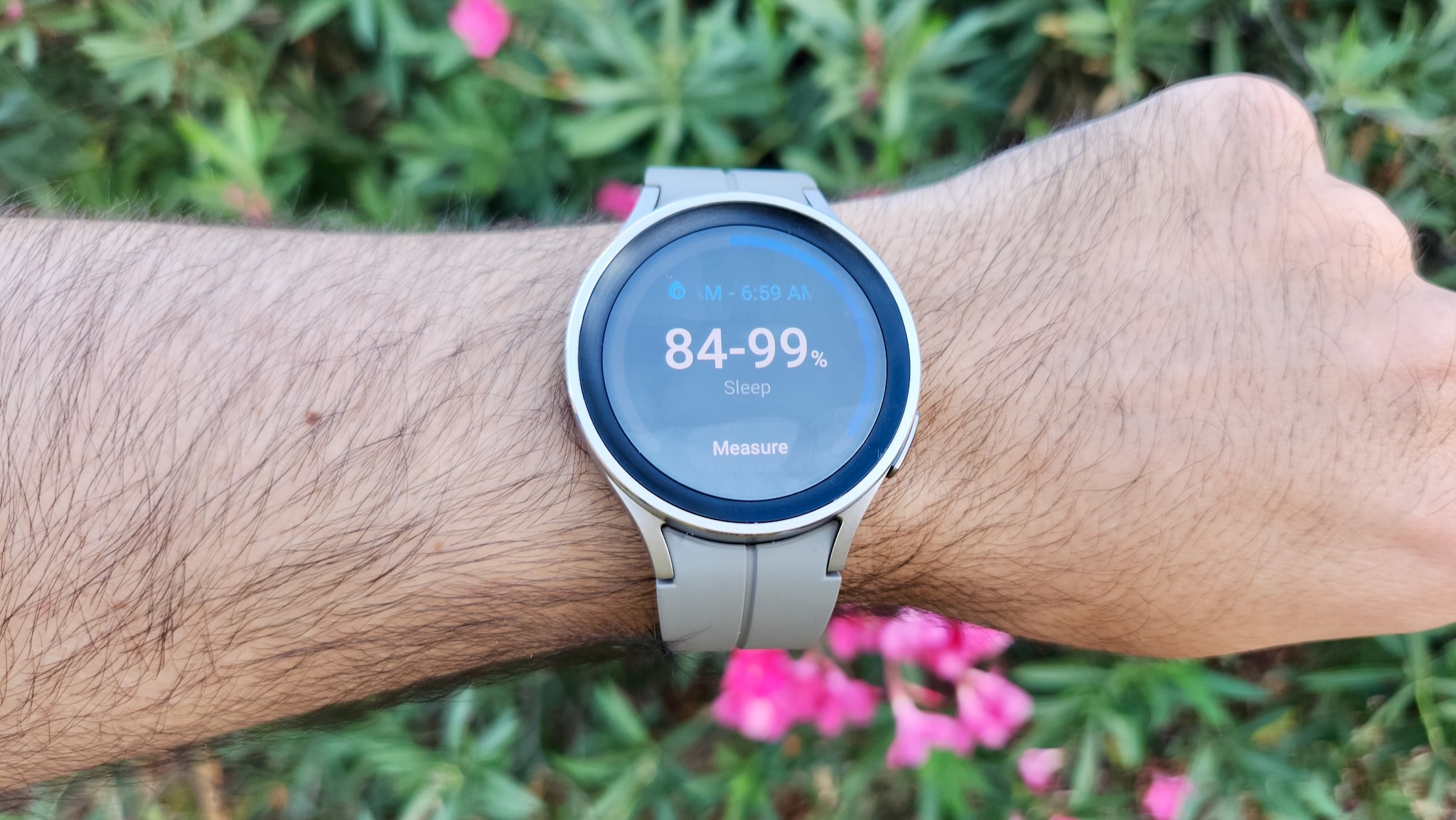Kasa Cam Outdoor review: Affordable quality
When it comes to home security cameras with local storage, this is one of the best no-fuss, reasonably priced options.
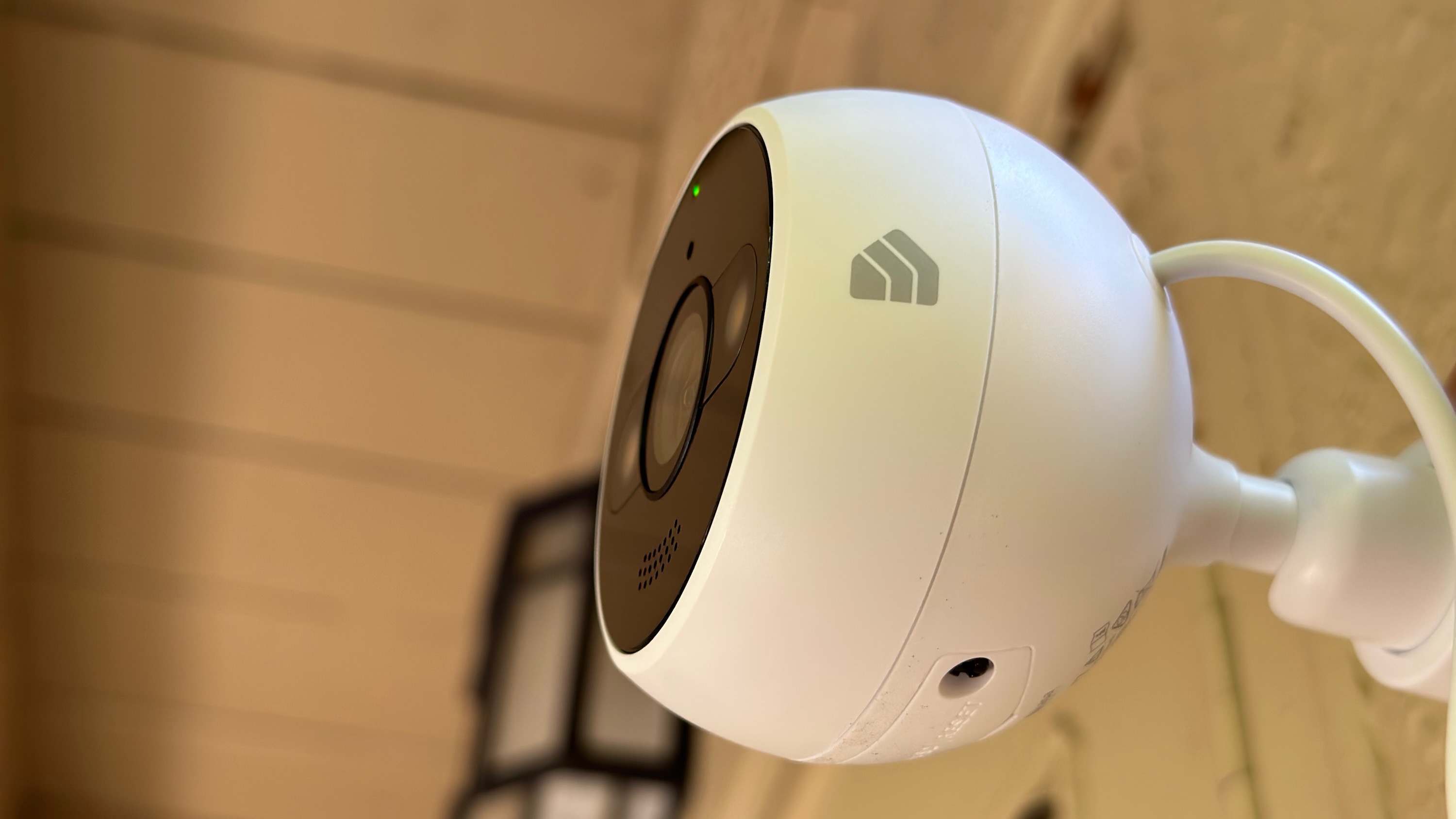
How much should you spend on an outdoor home security camera? Plenty of the most popular Arlo, Ring, Google, or other outdoor cameras will set you back hundreds of dollars, even before the monthly subscription comes into play. If you need to guard your backyard but just don't have that kind of budget, the Kasa Cam Outdoor is a solid option with only a few compromises to consider.
The Kasa Cam Outdoor advertises itself as a "24/7 Recording" camera on the box, and so long as you buy yourself a 256GB microSD card to go with it, the claim is accurate. You can save a couple of weeks of non-stop footage — the amount varies based on whether you save in 1080p or 2K — that you can look back through if you receive an AI-based motion alert.
The Kasa app also offers a reasonable $3/month Care Plus subscription with rolling 30-day cloud storage, manual recordings, and snapshots accompanying activity notifications that make it easier to ignore false-positive warnings. But this review focuses on the Kasa Cam Outdoor as one of the best home security cams with local storage for those who don't trust private footage on the cloud or just want to pay one flat rate.
So, on that note, here are all the key facts you need to know about the Kasa Cam Outdoor before deciding whether or not to buy it.
Kasa Cam Outdoor specs
| Specs | Kasa Cam Outdoor |
|---|---|
| Sensor | 1/3-inch |
| Resolution | 4MP (2560 x 1440) |
| Field of view | 110 degrees diagonal |
| Night vision | 850nm IR LED, up to 98 feet |
| Protection | IP65 |
| Audio | Mic and speaker |
| Power | 10-foot USB-A cable; 100–240V |
| Physical storage | Supports up to 256GB microSD card (not included) |
| Cloud storage | $3 per month: 30 days of history, manual clip recording, snapshots |
| Connectivity | 2.4GHz Wi-Fi, 802.11b/g/n |
| Privacy shutter | No physical shutter; turns off in app |
| Security | 128 bit AES encryption with SSL/TLS |
For a $60 camera, the Kasa Cam Outdoor has some high-quality specs. It has a proper 2K resolution — 1440p instead of the 2000 x 1200 resolution many "2K" devices sport. The camera has a wireless data rate of 11Mbps, 54Mbps, or 72Mbps, which should correspond with 720p, 1080p, or 1440p resolution.
The outdoor camera has a decent 110º field of view. For context, many of the best outdoor security cameras range from 130–160º FOV, but they also cost about three times as much. This trade-off means the Kasa Cam Outdoor is best suited for targeted coverage, such as a side yard or in a corner overlooking your backyard door.
Kasa doesn't make wireless cameras that we know of. The Kasa Cam Outdoor's power cable extends 10 feet and ends with a USB-A port; it comes with a simple 5V adapter out of the box, but you could theoretically buy a USB extension cord if you need one.
Get the latest news from Android Central, your trusted companion in the world of Android
As with any wired outdoor camera, you have the upside of never worrying about recharging it; the downside is that you need a well-placed 110V outlet... one where an intruder could easily unplug it and cut off your SD card access. As such, make sure you head to your nearby hardware store and buy a plug cover to guard against that (and protect the plug from water, too).
The camera itself has an IP65 rating, which means that it's fully dust-proof and is protected against low-pressure water streams. So long as you don't blast it with a hose, the Kasa Cam Outdoor should handle the outdoor elements just fine.
As a final point, the Kasa Cam Outdoor is fairly light and has a very straight-facing design. If you want a pan-and-tilt camera or even one that you can mount at an angle without too much fuss, you may need to look elsewhere.
Kasa Cam Outdoor: App and set-up
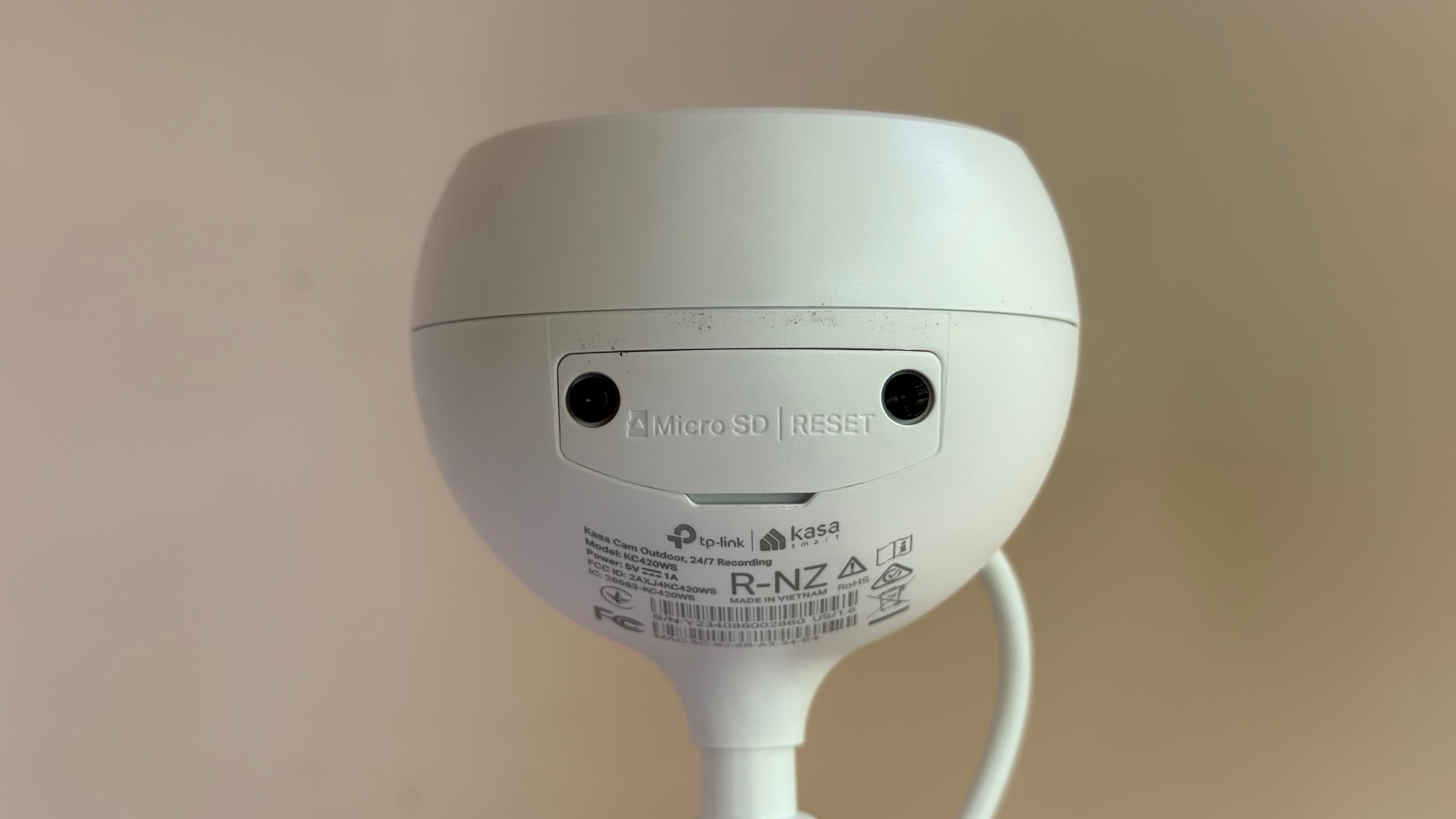
Mounting the Kasa Cam Outdoor isn't too difficult, as it comes with a mounting template with three holes, plus the screws you need. It requires a Phillips head screwdriver and most likely an electric drill with a 6mm drill bit as well. You'll also need a ladder to make sure the camera is high enough that someone can't mess with it, and possibly caulk or sealant if you plan to run the cable through a wall.
You set up the Kasa Cam Outdoor with the Kasa app (Android or iOS). You must connect your phone to the camera's Wi-Fi before it can detect your home network, an odd extra step that thankfully doesn't take long. For me, the initial firmware update failed until the camera couldn't be detected, forcing me to unplug it and replug it before everything worked. All that aside, the Kasa app is pretty straightforward.
In the app, you can adjust the following settings:
- Turn on privacy mode (there's no physical shutter)
- Enable 24/7 recording to an SD card
- Decide whether or not to record audio
- Decide if Night Mode should be full-color (with spotlight) at all times, or IR only until motion is detected
- Adjust activity zones (the portions of the display that register motion)
- Adjust video quality (2K, 1080p, 720p)
- Rotate the video 180º (depending on how it's mounted)
- Enable or disable the siren and change the volume (High, Medium, or Low) and duration (30 seconds, 2 minutes, 5 minutes)
- Turn off the status LED
In the actual camera view, you can tap the Mic icon to start 2-way talk between the phone and the camera. You can tap the light bulb icon to enable the spotlight for a short period of time or tap the megaphone icon to turn on that siren and scare people off. Other recording features show up here if you subscribe to Kasa Care.
You can also create schedules for specific days or throughout the week, determining when the camera will automatically turn on or off. And if you have 24/7 recording enabled, you'll find the option to go to a timeline of your full day, where you can pinch to zoom in on a specific moment or (if the camera detected motion) tap on a time-stamped event and jump to that moment.
Be prepared for a decently long loading time for microSD card footage, compared to the speed you get with cloud storage. The camera has to find and transmit the data to your phone over Wi-Fi, which takes time. I don't necessarily mind it because this feature isn't for catching a would-be thief in real time; it's for finding evidence of an intrusion — or saving some cute video of family or backyard critters — after the fact.
The Kasa Cam Outdoor is fairly quick at detecting motion after a small delay, probably due to the wireless connection. I also noticed a two-second delay when speaking to my partner through 2-way audio, though thankfully, the sound was clear. It's not unbearable, but you and your visitor are probably going to talk over one another by accident.
The activity zones are pretty dynamic, letting you drag to create your own geometric shapes instead of having to rely on preset squares; you should be able to avoid most false positives with the right settings.
To be clear, I tested my camera in an environment without much potential motion; I've read that some people had issues with sensitivity, so you may need to dial it down. Overall, I found the default 6/10 sensitivity rating worked for me, but I switched it, so it only needed 1 second of motion rather than 2 seconds to send an alert, which worked better for me.
Is the Kasa Cam Outdoor secure?
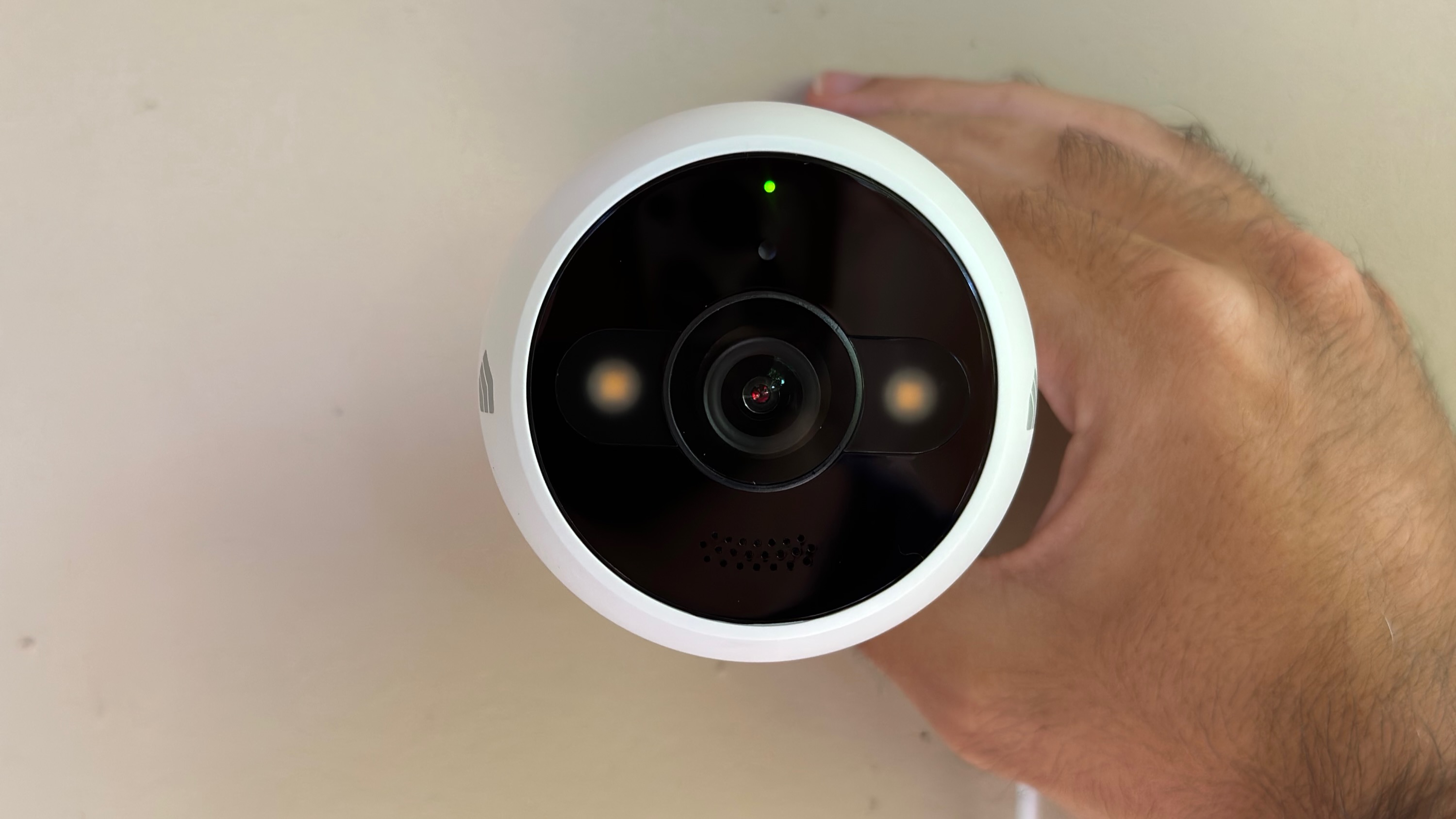
Earlier this year, I wrote about how it's nearly impossible to review security cameras because we never know whether or not a smart home security company is aware of or acting upon any possible breaches with their hardware or cloud servers. We can only take companies at their word, and doing so is risky.
How do Kasa and its parent company, TP-Link, rate in terms of security issues? We know of one significant problem spotted by Cequence Security researcher and "Hacker in Residence" Jason Kent back in 2020.
According to Kent, the Kasa app had several flaws that allowed hackers potential access; he informed TP-Link of the issues in March 2020. TP-Link ended up needing until June 15 to fix the problem but did work with Kent to resolve the issue rather than ignore it.
Since 2020, we haven't heard of any other security breaches from the company, whereas brands like Eufy, Ring, and Wyze have had more recent problems. We can't say for certain that TP-Link is better or if current issues haven't been publicly divulged, but we're tentatively happy to recommend the Kasa Cam Outdoor because its low price tag makes it less of a sunk cost if problems arise.
Should you buy the Kasa Cam Outdoor?
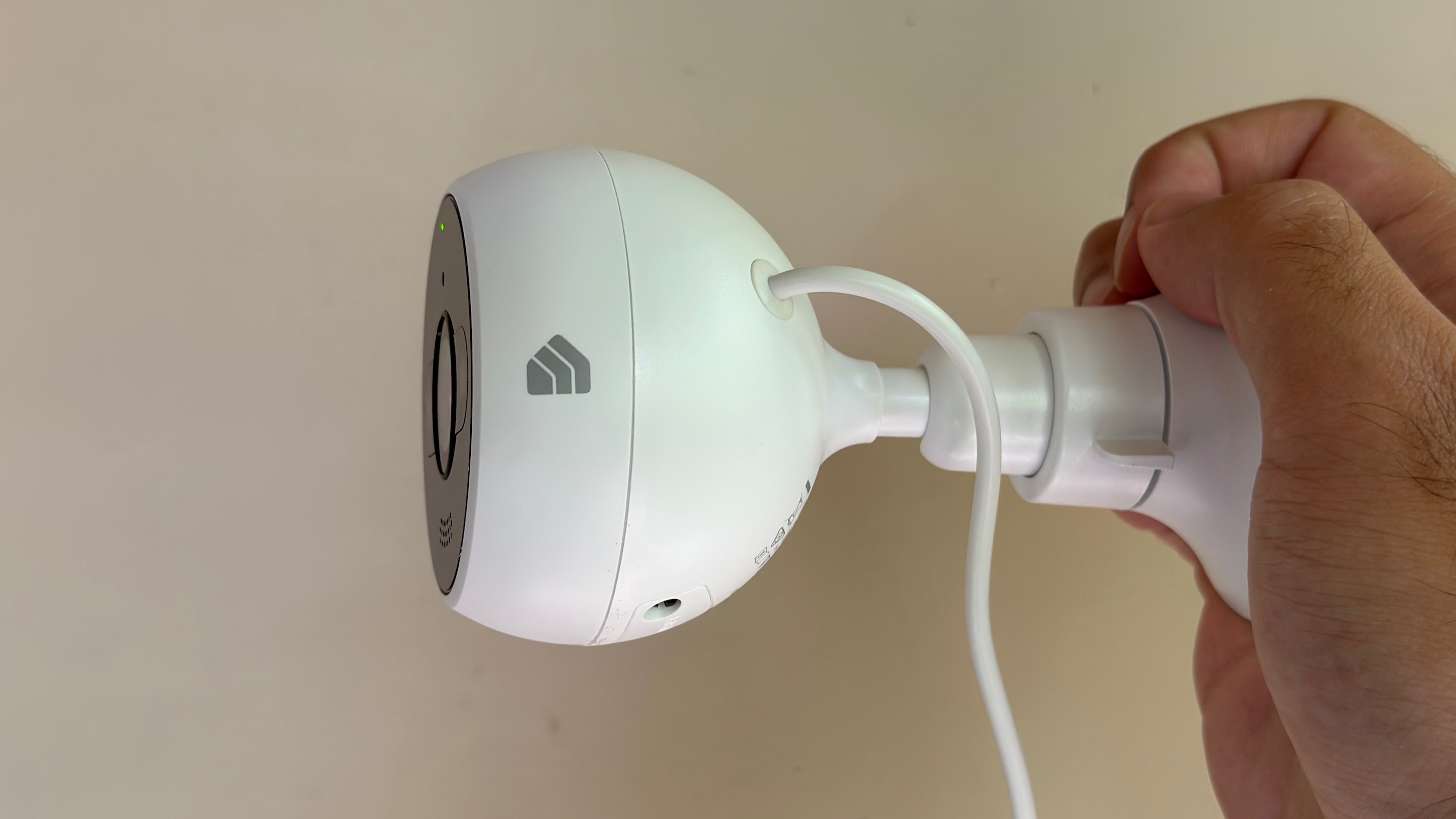
If you're looking for an outdoor home security camera with local storage, you don't have many options. The Blink Outdoor is a popular option, but it maxes out at 1080p, only supports 64GB of local storage, and costs more. Arlo Pro cameras have better specs, but you need a separate base station for local storage, and they cost significantly more. The EZVIZ C3TN is probably the most comparable security camera, with its 2K resolution, 256GB microSD slot, and color night vision for a similar price; it just lacks a spotlight, and the model is a bit dated.
For comparison, the Kasa Cam Outdoor is perfectly respectable. The visual quality for both daytime and nighttime is solid. Everything from the dual spotlights to the speaker quality more than lives up to the price tag. And you don't need a cloud subscription, whereas some brands lock AI detection behind it.
Overall, I'd recommend the Kasa Cam Outdoor if you're looking for something affordable and straightforward and don't need a top-of-the-line device with a wider FOV and more responsive speeds — or a design that makes it easier to angle in a specific direction. Just keep in mind that you'll have to buy a microSD card, too, to get the most out of it.
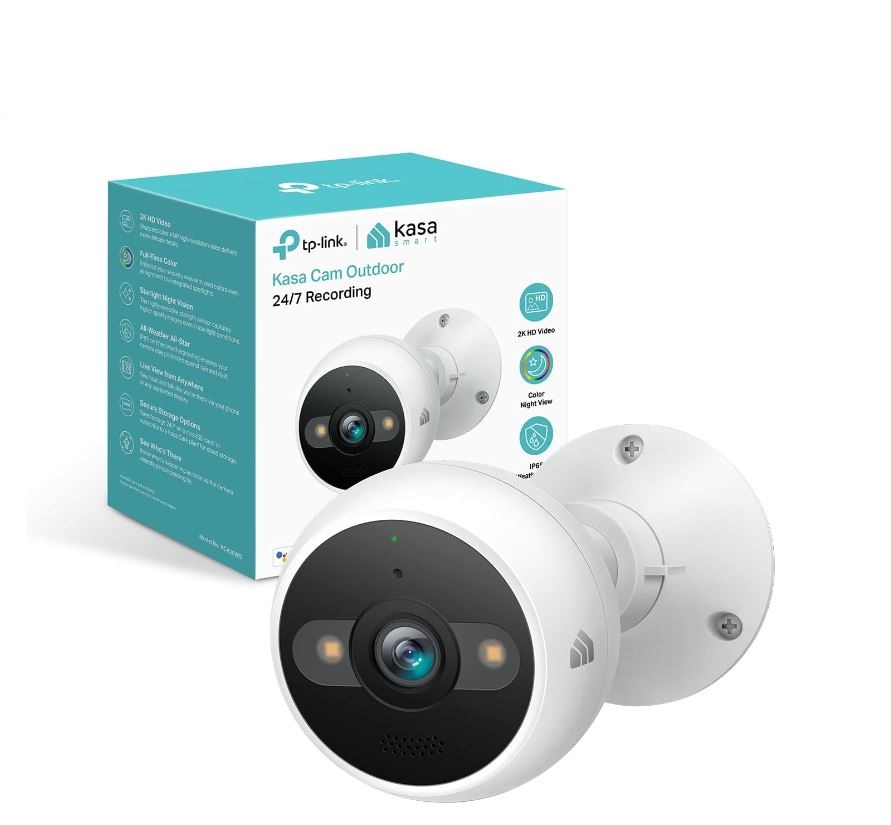
If you're looking for an affordable option for an outdoor camera, the Kasa Cam Outdoor is your ticket. It features 24/7 recording with a microSD card, activity zones, and up to 2K resolution with night vision.

Michael is Android Central's resident expert on wearables and fitness. Before joining Android Central, he freelanced for years at Techradar, Wareable, Windows Central, and Digital Trends. Channeling his love of running, he established himself as an expert on fitness watches, testing and reviewing models from Garmin, Fitbit, Samsung, Apple, COROS, Polar, Amazfit, Suunto, and more.
